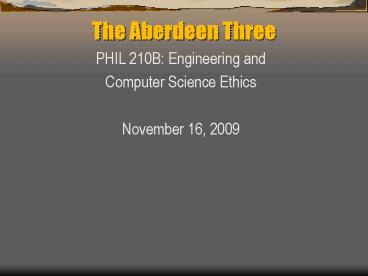The Aberdeen Three - PowerPoint PPT Presentation
1 / 15
Title:
The Aberdeen Three
Description:
Deontology. Natural Rights. No one died, so there is no violation of the Right to Life ... Deontology, Part 2. Kantian Universalizability ... – PowerPoint PPT presentation
Number of Views:1056
Avg rating:3.0/5.0
Title: The Aberdeen Three
1
The Aberdeen Three
- PHIL 210B Engineering and
- Computer Science Ethics
- November 16, 2009
2
Organizations and People Involved
- ABERDEEN PROVING GROUND - U.S. Army facility,
which employed the following three civilians - ROBERT LENTZ - Chemical Engineer.
- In charge of developing the processes that would
be used to manufacture chemical weapons. - WILLIAM DEE - Chemical Engineer.
- Headed the chemical weapons development team.
- CARL GEPP - Chemical Engineer.
- He answered to Dee and Lentz.
3
Events
- Since WWII, Aberdeen has been used by the US Army
to develop, test, and dispose of chemical
weapons. - Periodic inspections between 1983 and 1986
revealed serious problems at the facility, known
as the Pilot Plant, where these engineers worked.
4
According to one inspection
- flammable and cancer-causing substances were
left in the open chemicals that become lethal if
mixed were kept in the same room drums of toxic
substances were leaking. There were chemicals
everywhere--misplaced, unlabeled or poorly
contained. When part of the roof collapsed,
smashing several chemical drums stored below, no
one cleaned up or moved the spilled substance and
broken containers for weeks.
5
- All the managers had to do was make a request for
Army clean-up funds, but made no effort to
resolve the situation. - September 17, 1985 - Acid tank leaks into Canal
Creek. - Federal investigators arrived and discovered that
the chemical retaining dikes were unfit, and the
system designed to contain and treat hazardous
chemicals was corroded and leaking chemicals into
the ground.
6
- March 26, 1986 - Pilot Plant shut down.
- June 28, 1988 - Gepp, Dee, and Lentz indicted.
7
Additional Facts
- 1976 - Congress passed the Resource Conservation
and Recovery Act. - Regulated the management of facilities used for
the disposal hazardous waste. - RCRA implemented criminal fines for violations of
the open dumping or hazardous waste disposal
guidelines.
8
- The three engineers maintained that they had no
knowledge of RCRA - Seems unlikely
- Containers of hazardous chemicals are routinely
labeled with warnings that chemicals must be
disposed of according to RCRA requirements
9
Ethical Considerations
- Loyalty
- If the engineers had gone public, they would
have violated their prima facie duty to be loyal
to their employers.
10
NSPE Code of Conduct
- Section II.1. - Engineers shall hold paramount
the safety, health and welfare of the public in
the performance of their professional duties. - Every engineering code of conduct has a similar
clause. - Note You need 3 clauses like this one.
11
Ethics Filter
- Natural Rights
- No one died, so there is no violation of the
Right to Life - However, the negligence of the three engineers
put the health and safety of others at risk - Workers on site
- Civilians downstream
- This violates the Right to the Security of Ones
Person - Article 3 of the UN Declaration of Human Rights
12
Deontology, Part 2
- Kantian Universalizability
- Maxim It would be acceptable for all government
engineers to merely rely on their own expertise,
rather than EPA regulations on hazardous
materials. - Unlikely that Gepp et al. would approve such a
maxim - Consider, e.g., engineers working with nuclear
waste - Hence, they fail the universalizability test
- Ignoring the RCRA was a violation of ethical duty
13
Evaluation
- The engineers involved violated a prime
professional obligation (as well as the law). - Should have alerted their superiors at the first
sign of problems. - Each of them had the duty to know about the RCRA
and to inform the appropriate civilian and
military authorities of the violation. - Given the danger to the public and workers at the
plant, it would not have been sufficient to
merely inform their direct supervisors.
14
Alternatives
- 1. Army Commanders
- Make it part of the job requirements that
engineers acknowledge all relevant safety
regulations - Stiff individual penalties for violations
15
Alternatives (cont.)
- 2. System for Anonymous Whistle-blowing
- The subordinates involved most likely feared that
blowing the whistle would have jeopardized their
jobs - A system for receiving anonymous reports of
safety violations would have alleviated this fear































